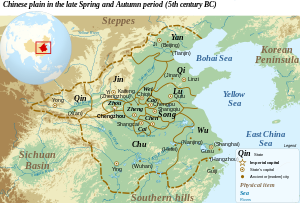Sichuan Basin
Sichuan Basin is a major geographical and cultural region located in southwestern China. It is renowned for its fertile lands and is encircled by mountains, which have historically made it a natural fortress. The basin is primarily in the Sichuan province, but it also extends into Chongqing municipality. This article delves into the geographical features, history, and significance of the Sichuan Basin.
Geography[edit | edit source]
The Sichuan Basin is characterized by its low-lying, flat terrain, contrasting sharply with the surrounding high mountains. It is bordered by the Qinling Mountains to the north, the Hengduan Mountains to the west, and the Yungui Plateau to the south. The Yangtze River flows through the basin, providing essential water resources for agriculture. The climate is humid subtropical, with distinct seasons, ample rainfall, and a long growing season that supports a variety of crops, including the famous Sichuan pepper.
History[edit | edit source]
Historically, the Sichuan Basin has been a cradle of Chinese civilization, with evidence of human habitation dating back thousands of years. It was known as the "Land of Abundance" due to its agricultural productivity. Over the centuries, it has been a strategic location due to its natural defenses and has played a significant role in China's military history. The basin was also a center for the spread of Buddhism in China, with numerous temples and monasteries established in the area.
Economy[edit | edit source]
The economy of the Sichuan Basin is diverse, with a strong emphasis on agriculture, industry, and services. The basin's fertile lands produce a variety of crops, including rice, wheat, and fruits. Sichuan cuisine, famous for its bold flavors and spiciness, is a significant cultural export. In addition to agriculture, the Sichuan Basin has developed a robust industrial sector, with industries ranging from electronics to petrochemicals. The region's rich cultural heritage and natural beauty also make it a popular destination for tourists.
Cultural Significance[edit | edit source]
The Sichuan Basin is not only important for its economic contributions but also for its rich cultural heritage. It is the birthplace of many important elements of Chinese culture, including Sichuan opera and Sichuan cuisine, known for its use of bold spices and flavors. The basin is also home to several UNESCO World Heritage Sites, which attract visitors from around the world.
Environmental Concerns[edit | edit source]
Despite its natural beauty and resources, the Sichuan Basin faces several environmental challenges. These include air and water pollution, largely due to industrialization and urbanization. Additionally, the region is prone to natural disasters, such as earthquakes and floods, which can have devastating effects on the population and infrastructure.
Conclusion[edit | edit source]
The Sichuan Basin is a region of immense importance to China, both historically and in the modern era. Its fertile lands, rich culture, and strategic location have shaped the course of Chinese history. Despite facing modern challenges, the Sichuan Basin continues to be a vital part of China's economic and cultural landscape.
Search WikiMD
Ad.Tired of being Overweight? Try W8MD's physician weight loss program.
Semaglutide (Ozempic / Wegovy and Tirzepatide (Mounjaro / Zepbound) available.
Advertise on WikiMD
|
WikiMD's Wellness Encyclopedia |
| Let Food Be Thy Medicine Medicine Thy Food - Hippocrates |
Translate this page: - East Asian
中文,
日本,
한국어,
South Asian
हिन्दी,
தமிழ்,
తెలుగు,
Urdu,
ಕನ್ನಡ,
Southeast Asian
Indonesian,
Vietnamese,
Thai,
မြန်မာဘာသာ,
বাংলা
European
español,
Deutsch,
français,
Greek,
português do Brasil,
polski,
română,
русский,
Nederlands,
norsk,
svenska,
suomi,
Italian
Middle Eastern & African
عربى,
Turkish,
Persian,
Hebrew,
Afrikaans,
isiZulu,
Kiswahili,
Other
Bulgarian,
Hungarian,
Czech,
Swedish,
മലയാളം,
मराठी,
ਪੰਜਾਬੀ,
ગુજરાતી,
Portuguese,
Ukrainian
Medical Disclaimer: WikiMD is not a substitute for professional medical advice. The information on WikiMD is provided as an information resource only, may be incorrect, outdated or misleading, and is not to be used or relied on for any diagnostic or treatment purposes. Please consult your health care provider before making any healthcare decisions or for guidance about a specific medical condition. WikiMD expressly disclaims responsibility, and shall have no liability, for any damages, loss, injury, or liability whatsoever suffered as a result of your reliance on the information contained in this site. By visiting this site you agree to the foregoing terms and conditions, which may from time to time be changed or supplemented by WikiMD. If you do not agree to the foregoing terms and conditions, you should not enter or use this site. See full disclaimer.
Credits:Most images are courtesy of Wikimedia commons, and templates Wikipedia, licensed under CC BY SA or similar.
Contributors: Prab R. Tumpati, MD




